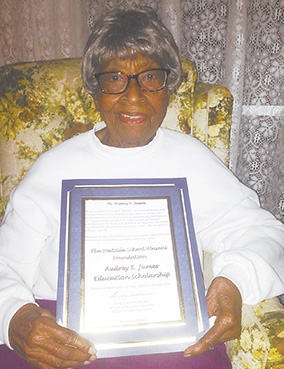Journey of a lifetime
February 17, 2015 by Las Vegas Black Image Magazine
Filed under Conversation
at 100 years of age, las Vegas legend Audrey E. James shares her dramatic life story and the uncommon wisdom that comes with a century of life.
BY KIMBERLY BAILEY-TUREAUD
I kept looking at my cell phone over and over again, making sure I didn’t miss what turned out to be one of the best and most memorable in-person interviews I have ever conducted.
Glancing at the directions on my cell phone, lovingly provided by community icon and acclaimed author Brenda Williams, I realized that I could actually guide myself to the home of historic educator Audrey E. James.
This is the Westside, where I grew up. I would go directly to Zion Methodist, where Rev. Bennett once pastored, to find my location. Now 100 years old, James was one of the original teachers at the Historic Westside School. As one might expect from a teacher, an on-time arrival was mandatory, (I had already been cautioned that, “Ms. Audrey has a strict daily routine she sticks to,” which involves going to work each day and driving her new car around town). How often, after all, does one get the opportunity to celebrate Black History Month by interviewing someone who has lived an entire century?
Ms. James was sitting comfortably in her living room upon my arrival, and she was quick to stand to and say, “Hello.” I was so amazed by her beauty, energy and wit. With a smile, she initiated our dialogue, and her laughter put me immediately at ease. I chose to sit at her knee during our discussion, and her chair seemed like a throne as she answered my endless stream of questions about her life’s journey.
Originally from Mississippi, Audrey E. James worked in cotton fields and on her family farm when she was young. There were few schools for black children in the 1920s, so she was in a classroom only three or four months out of the year.
She was exceptionally bright, though, and as a young woman she became a teacher. A family member made the fateful introduction to her future husband, Isaiah, and they moved to Las Vegas in 1952 so that he could further his career in construction. At the time, the city was known as “The Mississippi of the West.” She recalls: “When I arrived to Las Vegas in 1952 it was terribly ‘Jim Crow,’ and there was a sign at the bus depot that displayed the word, ‘Colored,’ and one that displayed the word, ‘White.’ I remember the section where the colored sign was, it only had a raggedy old bench for black people to sit on; on the other side, there were chairs for the white patrons to sit while waiting for their bus. Las Vegas was not quite as bad as Mississippi as it related to discrimination, but it resembled it.”
That reality was no secret: Through the late 1970s, Las Vegas was home to some of the nation’s most egregiously unjust treatment of African-Americans. Black people were denied equal employment and housing. For a time, the majority of Las Vegas Strip hotels wouldn’t allow blacks to enter the front door, let alone secure lodging. James remembers when she began noticing a change. “It was promoted all over the country that prizefighter Sonny Liston would be fighting in a major fight here in Las Vegas,” she said. “Dr. James McMillian was the president of the NAACP back then, and he and a group demanded that black people be able to attend that fight or they would launch a national boycott. The … Strip powerbrokers agreed to have dialogue with the NAACP, but Dr. McMillan said they were done talking. This was the beginning of the civil rights movement in Las Vegas against the racial injustices in the 1960s.”
Remembering her first home in Las Vegas (a signature “shotgun” home, so small that one could see through an open back door from the front porch), on C Street and Jackson Avenue in 1952, James said there were no sidewalks in the Historic Westside community—and even fewer opportunities. “I didn’t have a college degree when I came to Las Vegas, but one day I saw an ad in the paper that said classes to train new teachers would be held at the old Las Vegas High School. So I enrolled and took the classes to gain my credentials to teach. I started teaching at the Westside School where all of the black children attended school in Las Vegas — and where the first African-American teacher in the state of Nevada, Mabel Hoggard, taught. I really knew that Las Vegas was changing from the segregated norm when the schools were integrated and I went on to teach an all-white student body at Kit Carson School.”
Last July, in honor of her 100th birthday and pioneering role in local history, the Westside School Foundation named its annual scholarship award after James. The Audrey E. James Scholarship gives scholarships to qualifying high school seniors scholarships who enter and win an essay-writing contest.
With my allotted interview time running out, Ms. James graciously obliged my unusual closing request. I asked that she give me short, stream-of-consciousness responses to a series of words. My intent: to capture the essence of her wisdom; and in doing so, inspire us all to consider the value of her timelessly sensitive yet common-sense approach to life.
Happiness: “That’s a tough one. I would say you can have happiness by living true to yourself and being honest with others. Treat everybody how you want to be treated. Be yourself.”
Love: “Love should be shown, not spoken.”
Family: “Family should be close. Protect one another and share with each other.”






